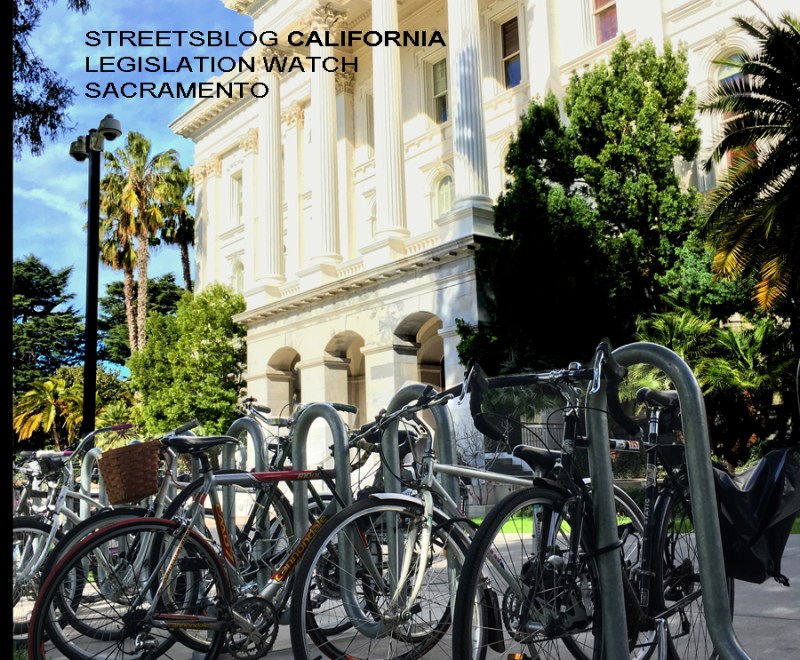As the California legislative session shifts into gear, with committee hearings starting on some of the easier, less controversial bills, it's probably a good time to take stock of what this year's crop of bills might accomplish in terms of bicycle and pedestrian safety.
Several big ones are back for a repeat: a bill to decriminalize jaywalking, one that would allow bicycle riders to legally treat stop signs as yield signs (not as blow-through-the-intersection signs), and another one that would create a pilot program to test speed cameras in select cities. Streetsblog covered previous iterations of these bills when they came close to the finish line last year, discussing the arguments in favor and against. For example, while speed cameras have been shown to reduce crashes and increase safety, there has been consistent pushback from some who believe they will be used as a source of revenue from fines. In addition, some pedestrian advocacy groups, notably California Walks, objected to last year's bill on the grounds that enforcement is not the solution to speeding.
Many key bills are on the list to be heard by the Assembly Transportation Committee this coming Monday, March 28, including
- Speed cameras: A.B. 2336, from Assembly Transportation Chair Laura Friedman (D-Glendale)
- Freedom to Walk Act: A.B. 2147 from Assemblymember Phil Ting (D-San Francisco)
- Stop signs as yield signs for bike riders: A.B. 1713 from Assemblymember Tasha Boernor Horvath (D-Encinitas)
- Bicycle Omnibus: A.B. 1909 from Friedman
- Pedestrian Crossing Signals: A.B. 2264 from Assemblymember Richard Bloom (D-Santa Monica). These last two were both discussed in some detail here.
A couple of planning bills are also on the agenda: A.B. 2337 from Friedman includes a number of different provisions that guide various state agencies to take a look at what's keeping them from implementing plans that are aligned with climate goals, as well as a provision calling for a program to build bicycle highways. And A.B. 2438, also from Friedman, begins the process of applying the results from a previous bill, A.B. 285, to make transportation planning align with state greenhouse gas reduction goals.
While not specifically about bikes, it's clear that bikes have a role in reducing greenhouse gas emissions, and any planning that takes into account climate goals will have to encompass them.
Another bill focused on planning, Senator Anthony Portantino's S.B. 932, sailed through its first committee, the Senate Governance and Finance Committee. It would require cities to pay more attention to bicycle and pedestrian issues in their general plans. The bill will be discussed further at some point by the Senate Transportation Committee.
A few other bills that are moving forward: the Assembly Transportation Committee passed A.B. 1946 on its consent calendar, without discussion. The bill, from Boerner Horvath, would set up state standards for e-bike training programs, "including, but not limited to, general electric bicycle riding safety, emergency maneuver skills, rules of the road, and laws pertaining to electronic bicycles."
This is an interesting notion - but a robust discussion, particularly with people who have experience with bike training programs, would be useful. What would an e-bike training program have to offer that isn't offered by existing bike education programs? Local, context-specific bike training programs have already been developed by bike advocates, and while they receive some support from government funding, maybe it's not enough to scale them up to the level the author of this bill may be anticipating could be needed.
Another bill heard in committee this week, A.B. 2074, from Assemblymember Mike Gipson (D-Compton), seeks to expand rebates from the Clean Cars for All program for small electric mobility devices, including e-scooters, skateboards, neighborhood electric vehicles, and golf carts.
The Clean Cars for All program already includes a small-ish ($10 million) set aside for the Air Resources Board to develop an incentive program for e-bikes, but that program has yet to be launched. The author argues that other kinds of small electric mobility devices that could substitute for car trips should also be eligible for rebates.
A representative from the South Bay City Council of Governments, which is sponsoring the bill, argued that these vehicles would be a boon in that community, where many households own two or more cars (it is "very overparked," she said) and would benefit from being able to replace some of them with smaller electric vehicles that go at a slow speed. Also, she said, they would be "safe" in part because cities are setting up networks of safe streets for bicycles and pedestrians, and these other vehicles could benefit from that.
Does that mean golf carts would use bike lanes? Maybe it's a discussion for the future, but first, let's put in more of those safe street networks she's talking about.
Streetsblog will keep an eye on developments as the session heats up.






